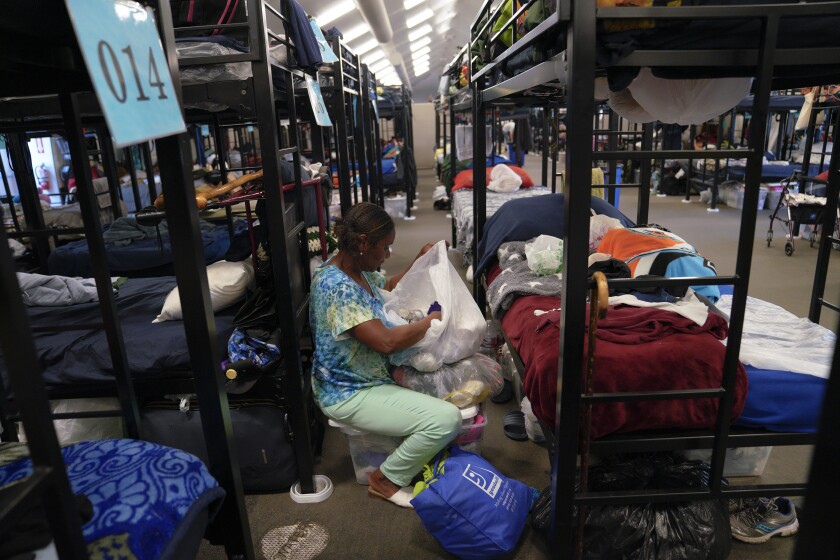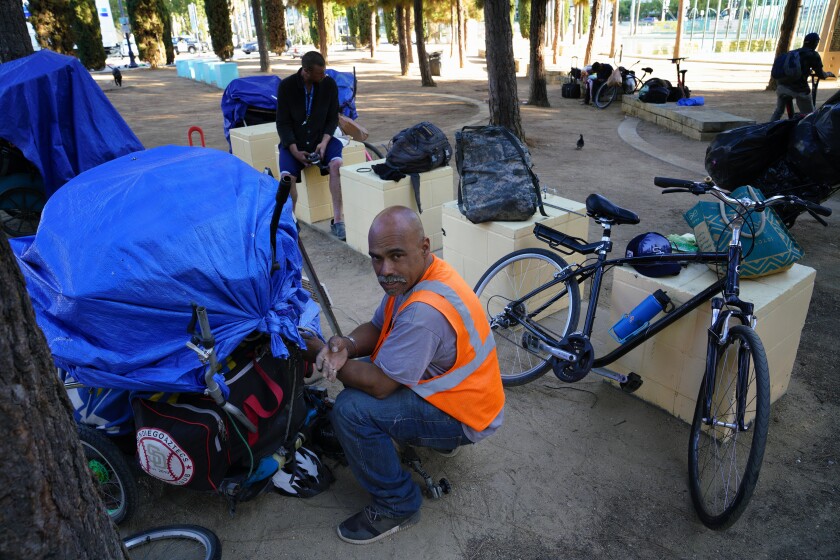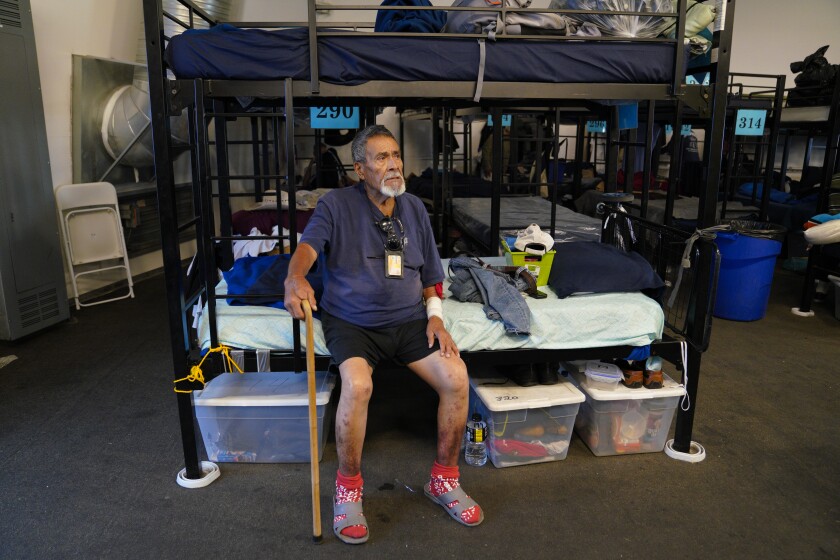
A White House council report blamed California’s homeless problem on housing regulation and tolerant police practices
By GARY WARTHSEP. 17, 2019 7:13 PM
A White House report on homelessness says San Diego’s homeless population could drop 38 percent by cutting housing regulations and suggests that shelters are responsible for increasing rather than reducing homelessness.
The State of Homelessness in America by the Council of Economic Advisers was released Monday night and stresses housing costs and “decades of misguided and faulty policies” as major contributors to the problem.
The report was quickly criticized by at least two national homelessness organizations as inaccurate.
Locally, service providers and a homeless advocate were critical of the report but did agree with some findings.
The report pushes for reductions in construction regulations, including energy and water efficiency mandates, as a way of making homes more affordable.
San Diego Mayor Kevin Faulconer’s office issued a statement saying that the city already is taking steps to reduce housing regulations, while homeless advocate Michael McConnell called the report bizarre and contradictory.
The report said President Donald Trump has addressed the root cause of homelessness by signing an executive order to remove “regulatory barriers in the housing market.”

It also states that expanding the supply of homeless shelters increases homelessness by decreasing the demand for new homes, which drives up housing costs. Using the same argument, the report states that allowing people to sleep on sidewalks rather than arresting them also drives up housing costs and increases homelessness.
Deacon Jim Vargas, president and CEO of Father Joe’s Villages, disagreed on both points.
“I’m not so clear on the logic in the report,” he said. “It cites a number of things, and I wonder how the conclusions have been reached.”
Vargas strongly disagreed that shelters contribute to homelessness, and said he believed the shelters operated by Father Joe’s have been important steps in leading people permanently out of homelessness.
He did agree that deregulation could reduce housing costs, but said it is not a panacea to the complex problem.
McConnell said he agrees that homeless shelters may contribute to homelessness, but not for the same reasons cited in the report.
“I think the way they’re getting to it is just bizarre,” he said. McConnell argued that shelters could contribute to homelessness if they are funded with resources that were funneled from long-term solutions such as housing.
He agreed that lowering housing prices could reduce homelessness, but said removing construction regulations would have no immediate effect in the crisis. Instead, McConnell argued the government should increase rental subsidies through housing vouchers.
“We need to treat this as an emergency, and just deregulating something isn’t treating it as an emergency,” he said. “It’s obvious they’re just pushing a policy shift.”
McConnell said he saw little sense in the report’s finding that increased policing of people sleeping on streets would reduce homelessness.
“I know people who have been arrested 50 or 60 times,” he said. “One thing San Diego is a great example of is criminalization doesn’t solve homelessness.”
Faulconer’s senior press secretary Ashley Bailey said San Diego already is taking steps to address homelessness and decrease housing costs.
“San Diego has taken significant action over the last few years to reduce homelessness,” she said in an email. “The report released by the administration details a number of recommendations that San Diego is already implementing including streamlining housing construction, opening more effective shelters, and urging the county to continue to take more action on our mental health crisis.”
Bailey also pointed to a month-old news release outlining city actions to streamline the development of permanent supportive and transitional housing for homeless people.
That same day, however, Faulconer said he would veto a City Council proposal to require developers to build more low-income housing. According to Bailey, the mayor believes the proposal would have unintended consequences leading to less affordable housing.

County Supervisor Nathan Fletcher, a member of the Regional Task Force on the Homeless, blasted the report.
“President Donald Trump has a big mouth, but small ideas,” Fletcher wrote in an email. “He is concerned with the optics of homelessness, but not tackling root causes that drive people to homelessness. Trump and his cronies have proposed slashing funding for housing and supportive services. San Diego and other communities across California are doing more with less, and we demand the Trump Administration stop making the problem worse, and get to work with constructive solutions that will help.”
John Van Cleef, chief executive officer of the Community Resource Center in Encinitas, disagreed with the report’s finding that the housing-first strategy has not been successful in reducing homelessness.
“I categorically believe in housing first and know that it works,” he said.
Under housing first, homeless people are offered permanent housing quickly and without conditions, and then provided with support services aimed at preventing them from returning to homelessness.
Van Cleef also said research has shown that more policing of homeless people extends homelessness by creating more barriers to overcome, and he disagreed that shelters add to the problem. Noting that the roots of homelessness can be complex, Van Cleef faulted the report for focusing on deregulation as a solution.
“This is such a diverse issue,” he said. “If any one report is focused on a single dimension, it misses the mark.”
Greg Anglea, executive director of Interfaith Community Services in Escondido, said the report should not dismiss past policies that have been proven to work.
“Federal government investment in housing-focused solutions over the past decade, including under the current administration, has coincided with a nearly 50 percent reduction in veteran homelessness nationwide,” he said. “We should build upon that success.”
The report gave little mention to mental health and drug abuse as contributing factors to homelessness, and said Trump already had addressed the issues.
“The President’s policies have contributed to the first reduction in total drug overdose deaths in decades through the expansion of drug treatment and reduction in the supply of illicit drugs,” it read. “An increased emphasis on serious mental illness and helping formerly incarcerated individuals reconnect with society via the First Step Act will help reduce the individual risk of entering homelessness as well.”
The First Step Act is aimed at reducing recidivism at federal prisons by helping prepare inmates to find jobs and pursue classes, among other steps.
The National Alliance to End Homelessness issued a statement saying the White House report reflected a fundamental misunderstanding of homelessness.
“Unfortunately, this report misrepresents key programs for ending homelessness, ignores the vast evidence base to support best practices, and overstates the potential of deregulation as an answer to the nation’s affordable housing crisis,” the statement read.
National Law Center on Homelessness & Poverty Executive Director Maria Foscarinis said in a news release that the report contradicted 19 of the administration’s own agencies and last year’s Federal Strategic Plan to End Homelessness, which stated that housing, low-barrier shelters and decriminalization were the best ways to end homelessness.
https://www.sandiegouniontribune.com/news/homelessness/story/2019-09-17/white-house-report-urges-deregulation-to-reduce-homelessness
About the Author
Written by Joe Rodríguez
Joe Rodríguez is a novelist, literary critic, war veteran, licensed vocational nurse and university professor who once slept on a steam grate at the very college where he would later teach. Rodríguez served in Vietnam from 1965-1966 and earned his bachelor’s degree in philosophy from San Diego State University in 1967. He went on to earn his Ph.D. from the University of California, San Diego, in 1977, and he taught in the department of Mexican American studies at San Diego State University. Rodríguez is also the author of “Oddsplayer” – a novel about Latino, Anglo and African American soldiers in the Vietnam War – and he is currently in the process of publishing his third book, “Growing the American Way” – a novel about a group of people who grow marijuana in secret in the desert, make a small fortune and turn their lives around. He currently resides in San Diego. He can provide knowledgeable commentary on his creative writing process, his experience being homeless, his military service, issues affecting Latin American people in the U.S. and what it was like to grow up in a military family
Recent Posts
Recent Comments
- chubby on L.A. is spending billions to fix homelessness. The problem is only getting worse
- https://pehrsilver.com on L.A. is spending billions to fix homelessness. The problem is only getting worse
- Silver Earrings For women online on L.A. is spending billions to fix homelessness. The problem is only getting worse
- Buy Silver Jewelry Online for women on L.A. is spending billions to fix homelessness. The problem is only getting worse
- Buy modern Silver Jewelry Online for Women in india on L.A. is spending billions to fix homelessness. The problem is only getting worse


